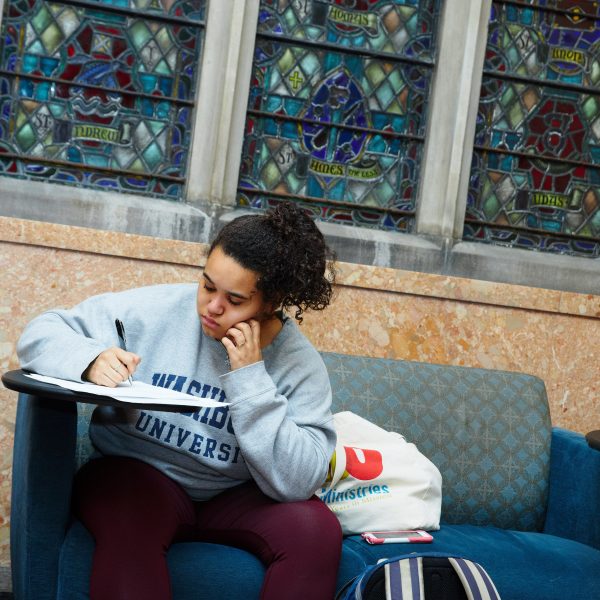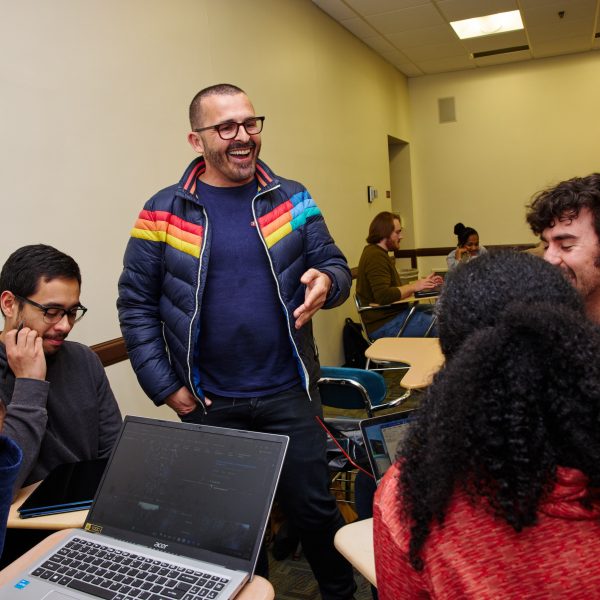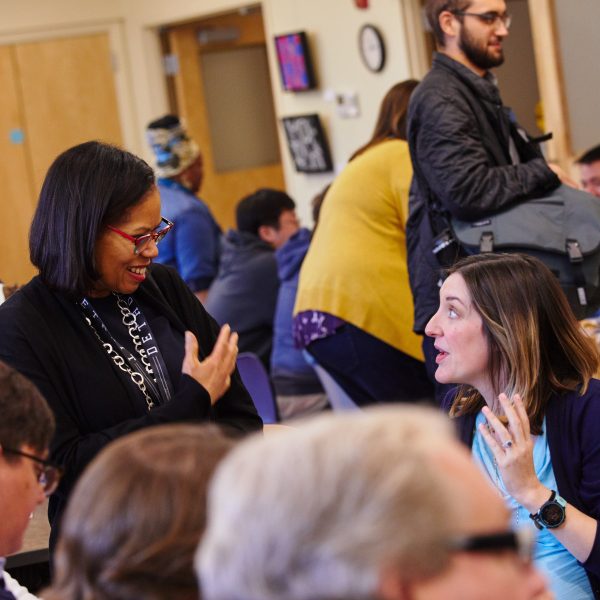Doctor of Ministry (DMin)
Are you called?
- To transform a congregation?
- To revolutionize a culture?
- To build the future?
- To be an architect of change?
Be the Spark for Transformational Change
The Doctor of Ministry degree (DMin) is a professional doctoral degree meant to enrich religious leaders in traditional and non-traditional settings, to deepen their understanding of and commitment to ministry, and to refine its practice. The focus of the Boston University DMin is Transformational Leadership, and anyone can become a transformational leader. You first need the desire to build new skills and explore new ideas, to understand your community and know its strengths and needs, and a willingness to see possibilities for transformative change.
The DMin program is a three-year, low-residency degree program that combines online learning with intensive on-campus classes, and allows you to craft the program that you will need for your ministerial practice.
Request Info or Join an Online Session
If you are a current DMin student looking for in-depth program information, please follow this link.
Cohort Support
Through five- to eight-day intensive seminars each semester, the program builds a peer community of professionals who learn from each other, exchange experiences, and forge supportive relationships that are strengthened through discussion and study throughout the year. Through lectures and small group discussion, you will absorb and apply what you learn while forming a learning network.
Online Learning
Interactive tools, such as web conferences, audio discussions, and live chats, allow you to engage with fellow students and teachers in real time, in discussions as lively as those found in any classroom. As a Doctor of Ministry student, you will have full access to the Boston University libraries to conduct research. Library staff offer online coaching sessions to help you gain the most from available research tools.
Course of Study
Seminars in Transformational Leadership, Contextual Analysis, and Research Methods form the core of the program, culminating in a Directed Study Project during your third year. Online cohort courses are taught by full-time Boston University faculty. Past courses have included Global Development and Faith, Mission and Outreach, Radical Christian Spiritualities, Transformational and Situational Homiletics, Embodiment, Church Renewal, Worship in Times of Change, and Conflict Transformation.
Program Demographics
- 58 current students, with 62 graduates since 2018
- Program participants represent a score of Christian denominations, Judaism, and Islam
- About 2 in 3 participants are persons of color
- Our program is open and affirming with regard to LGBTQ+ persons
What Does a DMin Project Look Like?
Rev. Dr. Goyo De La Cruz Cutimanco
Maya/Mam spirituality in “El Redentor” United Methodist Church in Memphis, Tennessee.
http://open.bu.edu/handle/2144/22612
Rev. Dr. David With
Post-recession mainline church revenue: how a for-profit BBQ restaurant might transform a post-Christian ministry
http://open.bu.edu/handle/2144/41313
Dr. Lisa Maree McDonald
Trinitarian leadership in an Australian Catholic healthcare ministry
http://open.bu.edu/handle/2144/37052
Rev. Dr. Nancy Wright
A watershed moment: care for the church and Earth’s waters
http://open.bu.edu/handle/2144/30038
Rev. Dr. Sandra Hasenauer
“A living For-Instance:” embracing a teleological vision of Beloved Community in American Baptist Women’s Ministries
http://open.bu.edu/handle/2144/30021
Rev. Dr. Brittany Longsdorf
Millennial Spirituality, the arts, and the changing landscape of American college chaplaincy
http://open.bu.edu/handle/2144/27347
Rev. Dr. Gary C. Sharp
Transforming parents: our most influential leaders.
http://open.bu.edu/handle/2144/41387
Rev. Dr. Shannon Karafanda
From the walking dead to living for Christ: developing a new mindset for church community
http://open.bu.edu/handle/2144/27346
DMin FAQs
Curriculum
Coursework will be completed on a part-time basis. Part-time students can expect to complete the program in three years. All students must complete the program in no more than five years.
To keep the variety of online courses fresh and provide Doctor of Ministry students with access to the widest possible variety of faculty members, the selection of courses will change from semester to semester. Course titles include:
- Embodying the Kin(g)dom
- Church Renewal
- Global Development and Faith
- Mission and Outreach: Foundations for Transformation
- Situational Preaching and Transformation
- Conflict Transformation for Ministry
- Radical Christian Spiritualities
- Worship in Times of Change
- Sabbath: Theology and Practice
- Liberated Community
The STH Bulletin contains the official description of the degree program along with admissions and financial information. The DMin Handbook contains the policies and procedures by which the degree program is governed.
What are the application requirements?
Applicants must possess an MDiv degree (or equivalent) with a minimum GPA of 3.3 from an institution of higher education accredited by a US agency recognized by the Council for Higher Education Accreditation or approved by a Canadian provincial quality assurance agency. Degrees from institutions outside of North America may also be accepted (subject to review by the Associate Dean for Academic Affairs). Applicants also must have completed a minimum of three years of full-time professional ministry or its equivalent. If you do not hold an MDiv degree, you may still be eligible to apply. Please review our MDiv Equivalency Application Procedures.
How much will the In-Service DMin cost to complete?
The DMin costs approximately $26,440 in tuition and fees over the course of three years (six semesters) of part-time study, plus travel to Boston for the intensive seminars. During the first year of the program, the intensive courses and cohort building last eight nights for each stay in August and January. During the second year, the intensive courses are a five-day commitment with the preceding evening optional.
| Year One | Year Two | Year Three | Total | |
|---|---|---|---|---|
| Tuition and Fees* | $12,920 | $9,840 | $3,680 | $26,440 |
| BU Intensive Housing* | $2,050 | $2,050 | $0 | $4,100 |
| Average Transit and Meals | $1,200 | $1,200 | $0 | $2,400 |
| Totals | $15,540 | $13,090 | $3,680 | $32,940 |
*Figures shown use 2025-2026 prices. Tuition and fee rates and may change.
Students in the Doctor of Ministry in Transformational Leadership program are not eligible for financial aid from the School of Theology. However, there are resources to assist these students with academic costs:
- Additional Scholarships: To aid students in their scholarship search, the School of Theology’s Financial Aid Office maintains a large list of outside awards and scholarships, arranged by eligibility, here.
- Federal Unsubsidized Loan: Students taking at least 6 credits per semester are eligible to apply for a federal unsubsidized loan. To apply, students need to submit the STH Financial Aid Application and FAFSA (with IRS data retrieval). Both applications can be found here.
How much do I need to learn about technology to learn online?
Amazingly little! If your computer is a standard PC or Mac and was purchased in the last two to three years, it is probably fast enough to handle the task. If you want to be sure, read more about BU’s technical specifications for its Learning Management System from Blackboard. Blackboard works through most of the common internet browsers (Firefox, Safari, Chrome, and Internet Explorer) and doesn’t require you to download special software. For a general sense of Distance Education at BU before you decide to apply, BU has more information for prospective online students.
For classes when everyone is online at the same time, we use an online meeting software that that takes only seconds to download and install. You will also need a headset and microphone combo, and Internet speed of at least five Mbps. A Student Services Coordinator is assigned to each course to help you with any technical difficulties that may arise.
What are the online classes?
Most of the School of Theology online courses also involve some synchronous learning, meaning everyone is online at the same time. This can involve text chatting with each other, talking and listening to each other, and/or seeing videos of each other. We think this builds community and honors our perspective on incarnational (embodied) learning.
We believe that theological learning is best done in community and that philosophy carries over into online learning. While your learning will center on your own interests, you will consistently engage in dialogue with others about those interests. This is not the kind of online learning in which you are a lone ranger studying at your own pace. It is rigorous and collaborative.
Where and when do the on-campus intensive courses take place?
Students begin the program with one of the two annual intensives at Boston University, in August or January. The schedule is designed to build community between cohort members before students begin the online portion of the program. During the August session, students may choose to stay on Boston University’s urban campus or may stay off campus and join their cohort for classes and community meals. During the January session when on-campus housing is unavailable, we offer a group rate at a hotel within walking distance of the School of Theology.
The exact dates of the intensives are discerned a few months ahead of when they will be offered. They are scheduled so active ministers only have to take one weekend away from their congregations.
Next January Intensive Course Dates (for first year students)
- January 3-12, 2024
Next August Course Dates (for second year students)
- First two weeks of August 2024
What are the intensive courses like?
Intensives are a rigorous time of learning from Boston University’s leading faculty, with Sunday reserved for reading, writing, or Sabbath activities. The cohort have lively class discussions, share meals together, and immerse themselves in Boston by visiting churches and cultural sites that are relevant to the course. Past teachers have included Dean Emerita Mary Elizabeth Moore, teaching on Transformational Leadership, and Dr. Walter E. Fluker and Dr. Claire E. Wolfteich teaching “Contextual Analysis for Transformational Leadership.” Students report that the discussions and learning help them to build a close-knit cohort that can support and learn from each other throughout the year.
DMin Handbook
- DMin Handbook (updated November 2020) contains the policies and procedures by which the degree program is governed.
DMin Learning Outcomes
The DMin degree program is designed to assist religious professionals to deepen their understanding of and commitment to ministry by providing a context in which to update and refine their theological knowledge, sharpen existing skills, and learn new ones. The aim is to help students bring together their experience with additional academic studies to create a fresh synthesis of theory and practice.
The primary learning outcomes of the DMin include:
- an advanced understanding of the nature and purposes of transformational religious leadership;
- enhanced capacity and competencies for practicing transformational religious leadership;
- growth in one’s capacity for a robust embrace of and engagement with social and theological diversity and one’s capacity to relate across difference;
- development of competency in contextual analysis and new knowledge about religious leadership in particular contexts;
- the integration of knowledge, contextual analysis, and leadership skills into a theologically reflective vocational praxis;
- continued growth in personal and spiritual maturity and in the cultivation of a personal and professional ethic.
State Authorization Reciprocity Agreement
The State Authorization Reciprocity Agreement (SARA) is a voluntary agreement amongst member states, territories, and districts of the United States that establishes one set of national standards and rules for distance education offerings. States that wish to become members of SARA apply to their regional education compact for approval. Once a state has been approved, institutions within that state may apply to the designated state portal entity for approval to participate in SARA. Currently, 49 states (all but California), the District of Columbia, Puerto Rico, and the U.S. Virgin Islands have joined SARA. Boston University has been approved under the terms and provisions of SARA to operate its distance education programs in SARA-approved locations.
Boston University State Authorization and Distance Education Disclosures site provides a variety of information regarding distance education programs, including:
- Complaint Resolution process for Massachusetts, and each state
- Information on the Refund Policy applicable to students in distance education programs
- Information about distance education programs that lead to professional licensure and certification; and
- Authorizations by State: State-by-state authorizations and information, including complaint procedure information for the location and any state-specific disclosures.
Students in online programs at Boston University School of Theology are encouraged to bring program problems to the attention of the Director of Online and Hybrid Programs, Dr. Debbie Brubaker, or the Academic Dean, Dr. Bryan Stone. Additional resources and information are itemized here:State Authorization and Distance Education



